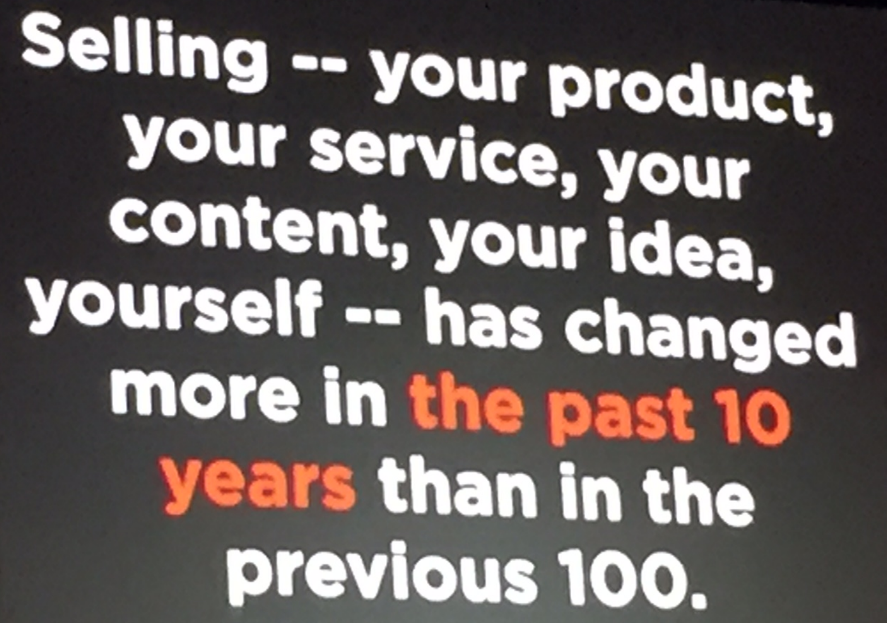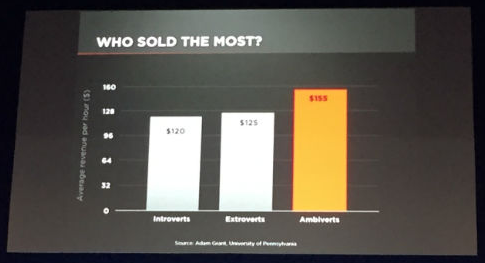Copyblogger Authority Rainmaker 2015 conference review series #1

Sales has changed radically. More radically in the last 10 years than in the last hundred years according to Daniel Pink, author of the #1 bestseller To Sell is Human.
Marketers no longer have the advantage of a captive audience like they did when there were a limited number of media outlets and we have shifted from a world of buyer beware to a world of seller beware. Daniel Pink calls this information asymmetry.
This means you have to sell less and engage more via helpful content.
Dan Pink’s talk was organized into the following structure:
A. One insight
B. Three principles
C. Five takeaways
One insight: What do I do about this?
He mused that top MBA programs don’t teach sales, although they do teach how to manage sales people lol.
Three sales principles
- Attunement – it’s important to find common ground with prospects If you are just giving a monologue and not listening, asking questions and attuned to your prospects, you’ll never find common ground or create a deep connection.
- Buoyancy – it’s important to stay afloat in an ocean of rejection Dan said that you can increase your sales experience and buffer rejection by using a positive affirmation such as “you can do this”. Even better is to ask yourself “can you do this?” Top athletes do this before they perform and it makes them mentally prepared for competition by creating powerful internal dialogue that pushes them to affirm what they are capable of.
- Clarity – help customers learn what questions to ask In this day and age, customers have an incredible amount of answers right at their fingertips. What they often don’t have is someone to help them curate the information and decide what questions to ask.

Five takeaways – sales tips
- People think that extroverts are better sales people but in reality ambiverts are the best. Glad-handing used car salesman types don’t make the most sales but neither do introverts who can’t leave the house. The good news for many of us is that research shows people who are somewhere in the middle connect with customers best.

- Asking questions is one of the most powerful sales tools and it helps customers internalize their debate about working with you. Ronald Reagan asked the country “are you better off than you were four years ago?” He did not say to Jimmy Carter, “Your economic policy deteriorated over the last 48 months.” This made people draw their own conclusions deeply. This principle works great when the facts are clearly on your side but does not work great when they are not.
- A principle outlined by Dr. Robert Cialdini says that a small negative added to a list of benefits of your product or services can significantly increase trust. So next time you add a big bullet list of everything that is so wonderful about you and your company on your website, strongly consider adding a very small negative that makes you more human and believable.
- Rhymes enhance processing influency. Studies show that rhymes, lists, alliteration and repetition help in marketing. E.g. “Woes unite foes” versus “Woes unite enemies”, works better. Children learn from nursery rhymes and this is ingrained in our DNA. We can make use of this in sales and marketing.
- Give people an offramp and make it easy. Sometimes it’s not about changing people’s minds but just making it very easy for them to act.
Daniel closed by saying essentially that it is important to serve first and sell second. That helps to make selling human.
When surveyed, Daniel showed how people have very bad things to say about salespeople. In reality, we are all selling something just about every day but the key is helping people by selling what they already want and not pitching to those that have no interest.
